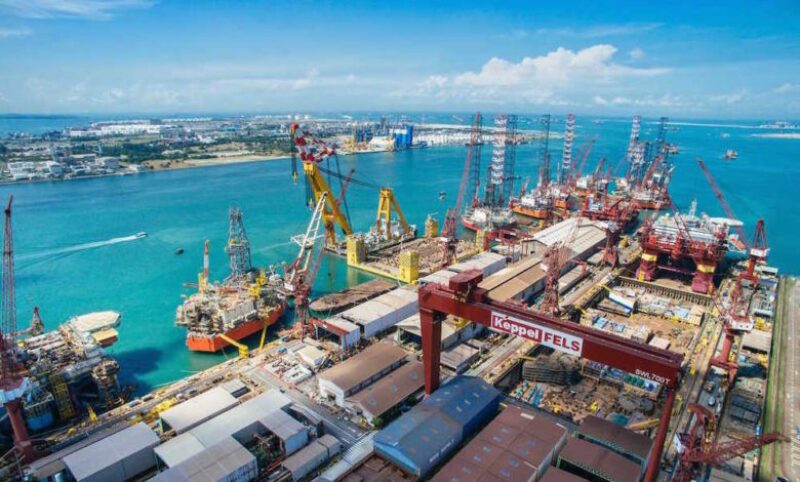Singapore’s Keppel Corporation (Keppel) cited the “global energy transition and major disruptions facing the oil industry” in its announcement on 28 January that it will exit the offshore rig-building business after completing the rigs now under construction.
It will not undertake any new project requiring large upfront capex, or without milestone payments. It will also progressively exit low value-adding repairs and other activities with low bottom-line contribution.
The company will be restructured into three parts, separating construction and ownership of legacy drilling rig assets from its core operations, “which will be slimmer, asset-light, and people-light,” it said in a statement.
Wholly-owned subsidiary, Keppel Offshore & Marine (Keppel O&M), will be aligned to Keppel’s Vision 2030 and aimed at supporting the energy transition by developing and integrating offshore energy and infrastructure assets.
“The share of renewables and new energy solutions in the global energy mix has been growing rapidly, driven by environmental concerns as well as technological advancements and the declining cost of renewables. Natural gas, as a transitional fuel, is also projected to overtake oil as the world’s largest energy source in the years to come. To seize opportunities in this fast-changing environment, we are making bold and decisive moves to transform Keppel O&M to ensure that it remains relevant and competitive, and fully aligned to Keppel’s Vision 2030,” said Loh Chin Hua, CEO of Keppel Corporation and chairman of Keppel O&M.
He added, “We are also exploring inorganic options for the O&M business, but there is no assurance that any transaction will materialize. In the meantime, we believe that our organic restructuring of Keppel O&M will not only enhance its competitiveness, but also its attractiveness, if we were to undertake any inorganic action.”
Three-Part Restructuring
The restructuring will begin immediately is expected to be executed over the next 2 to 3 years.
The company described the three entities as a Rig Co and a Development Co (Dev Co), which will be transient entities created to hold its approximately $2.2 billion worth of completed and uncompleted rig assets; and an Operating Co (Op Co), comprising the rest of Keppel O&M.
Rig Co. Keppel O&M’s completed rigs will be placed under the Rig Co, which will put the completed rigs to work, or sell them if there are suitable opportunities. This will only be a transitional arrangement until the oil market recovers, utilization and day rates improve, and the rigs generate steady cash flow. Then, the Rig Co will sell the rigs or collaborate with Keppel Capital to seek funding from external investors. A cash-flow generating Rig Co can be monetized or spun off in the future. The Rig Co is expected to be self-sustaining and would only require limited initial funding to maintain the rigs.
Dev Co. Uncompleted rigs will come under the Dev Co, which will focus on completing the rigs, while managing cash flow. Priority will be given to completing rigs that have firm contracts with customers. The Dev Co will be wound up, once the rigs have been completed and delivered to customers, or transferred to the Rig Co, where they will be put to work or sold. The Dev Co would require some initial funding from Keppel, after which it is expected to operate independently.
The Rig Co and Dev Co are collectively expected to require about $367 million in net funding, mainly for the latter to complete the rigs. This will be provided progressively by Keppel Corporation and repaid over time.
Op Co. The Op Co, comprising the rest of Keppel O&M, will progressively transition to a developer and integrator role, focusing on design, engineering, and procurement. It will be people-light and asset-light, with fabrication work subcontracted to its ecosystem of contractors, including other yards. Keppel O&M’s yard operations will be streamlined, including repurposing or divesting part of its global network of yards. At the same time, the Op Co will invest in capability building as it seizes new opportunities.
The Op Co has a net order book of $2.5 billion, 82% of which is in renewables and gas solutions, will focus on opportunities in the energy transition and is expected to be self-sustaining, financially independent, and profitable over time.
It will seek opportunities in floating infrastructure and infrastructure-like projects that can deliver predictable streams of cash flow, including renewables projects such as offshore wind farms and solar farms, gas solutions, production assets and new energy solutions such as hydrogen and tidal energy. It will collaborate with other Keppel business units and harness the synergies of the Group to provide diverse solutions for sustainable urbanization, such as offshore and nearshore infrastructure and floating data center parks, and also explore how Keppel O&M’s offshore rig technology can be repurposed for other uses.

